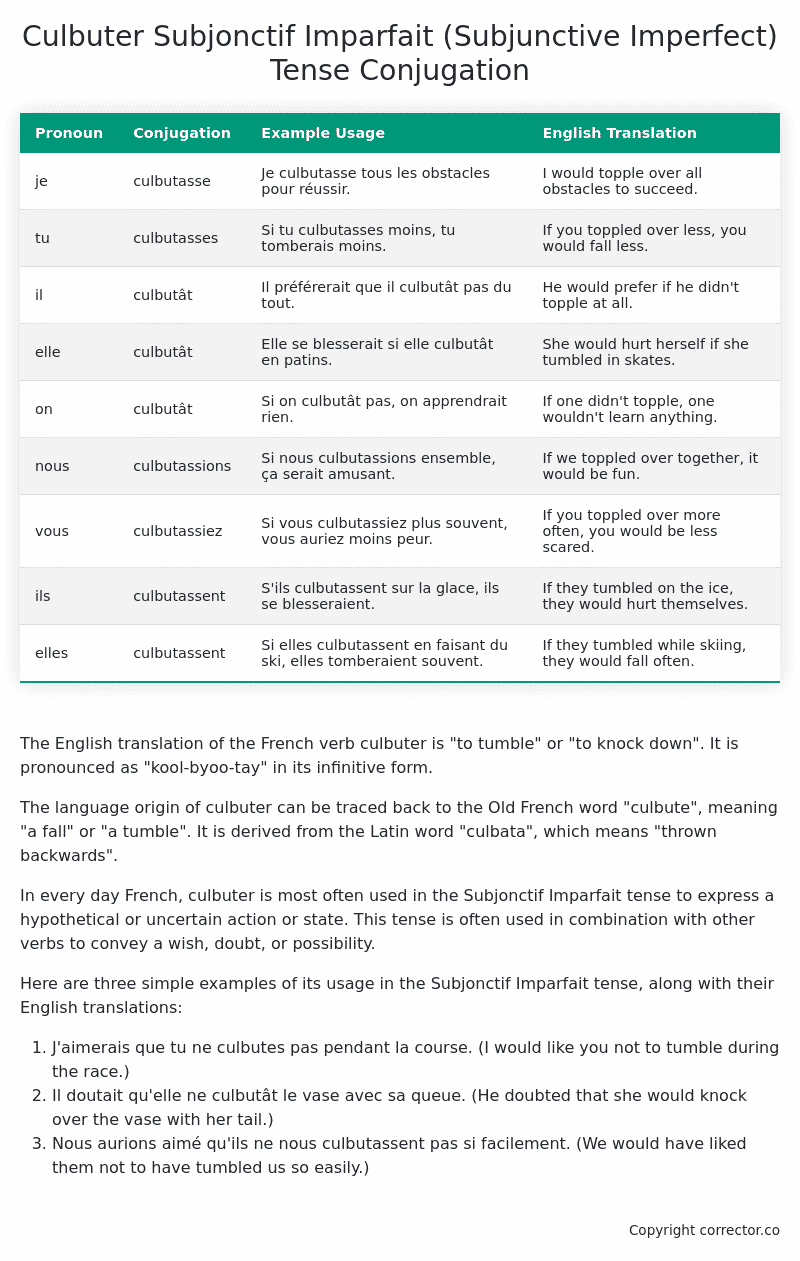Subjonctif Imparfait (Subjunctive Imperfect) Tense Conjugation of the French Verb culbuter
Introduction to the verb culbuter
The English translation of the French verb culbuter is “to tumble” or “to knock down”. It is pronounced as “kool-byoo-tay” in its infinitive form.
The language origin of culbuter can be traced back to the Old French word “culbute”, meaning “a fall” or “a tumble”. It is derived from the Latin word “culbata”, which means “thrown backwards”.
In every day French, culbuter is most often used in the Subjonctif Imparfait tense to express a hypothetical or uncertain action or state. This tense is often used in combination with other verbs to convey a wish, doubt, or possibility.
Here are three simple examples of its usage in the Subjonctif Imparfait tense, along with their English translations:
- J’aimerais que tu ne culbutes pas pendant la course. (I would like you not to tumble during the race.)
- Il doutait qu’elle ne culbutât le vase avec sa queue. (He doubted that she would knock over the vase with her tail.)
- Nous aurions aimé qu’ils ne nous culbutassent pas si facilement. (We would have liked them not to have tumbled us so easily.)
Table of the Subjonctif Imparfait (Subjunctive Imperfect) Tense Conjugation of culbuter
| Pronoun | Conjugation | Example Usage | English Translation |
|---|---|---|---|
| je | culbutasse | Je culbutasse tous les obstacles pour réussir. | I would topple over all obstacles to succeed. |
| tu | culbutasses | Si tu culbutasses moins, tu tomberais moins. | If you toppled over less, you would fall less. |
| il | culbutât | Il préférerait que il culbutât pas du tout. | He would prefer if he didn’t topple at all. |
| elle | culbutât | Elle se blesserait si elle culbutât en patins. | She would hurt herself if she tumbled in skates. |
| on | culbutât | Si on culbutât pas, on apprendrait rien. | If one didn’t topple, one wouldn’t learn anything. |
| nous | culbutassions | Si nous culbutassions ensemble, ça serait amusant. | If we toppled over together, it would be fun. |
| vous | culbutassiez | Si vous culbutassiez plus souvent, vous auriez moins peur. | If you toppled over more often, you would be less scared. |
| ils | culbutassent | S’ils culbutassent sur la glace, ils se blesseraient. | If they tumbled on the ice, they would hurt themselves. |
| elles | culbutassent | Si elles culbutassent en faisant du ski, elles tomberaient souvent. | If they tumbled while skiing, they would fall often. |
Other Conjugations for Culbuter.
Le Present (Present Tense) Conjugation of the French Verb culbuter
Imparfait (Imperfect) Tense Conjugation of the French Verb culbuter
Passé Simple (Simple Past) Tense Conjugation of the French Verb culbuter
Passé Composé (Present Perfect) Tense Conjugation of the French Verb culbuter
Futur Simple (Simple Future) Tense Conjugation of the French Verb culbuter
Futur Proche (Near Future) Tense Conjugation of the French Verb culbuter
Plus-que-parfait (Pluperfect) Tense Conjugation of the French Verb culbuter
Passé Antérieur (Past Anterior) Tense Conjugation of the French Verb culbuter
Futur Antérieur (Future Anterior) Tense Conjugation of the French Verb culbuter
Subjonctif Présent (Subjunctive Present) Tense Conjugation of the French Verb culbuter
Subjonctif Passé (Subjunctive Past) Tense Conjugation of the French Verb culbuter
Subjonctif Imparfait (Subjunctive Imperfect) Tense Conjugation of the French Verb culbuter (this article)
Subjonctif Plus-que-parfait (Subjunctive Pluperfect) Tense Conjugation of the French Verb culbuter
Conditionnel Présent (Conditional Present) Tense Conjugation of the French Verb culbuter
Conditionnel Passé (Conditional Past) Tense Conjugation of the French Verb culbuter
L’impératif Présent (Imperative Present) Tense Conjugation of the French Verb culbuter
L’infinitif Présent (Infinitive Present) Tense Conjugation of the French Verb culbuter
Struggling with French verbs or the language in general? Why not use our free French Grammar Checker – no registration required!
Get a FREE Download Study Sheet of this Conjugation 🔥
Simply right click the image below, click “save image” and get your free reference for the culbuter Subjonctif Imparfait tense conjugation!

Culbuter – About the French Subjonctif Imparfait (Subjunctive Imperfect) Tense
Formation
Common Everyday Usage Patterns
Interactions with Other Tenses
Subjonctif Présent
Indicatif Passé Composé
Conditional
Conditional Perfect
Summary
I hope you enjoyed this article on the verb culbuter. Still in a learning mood? Check out another TOTALLY random French verb conjugation!


